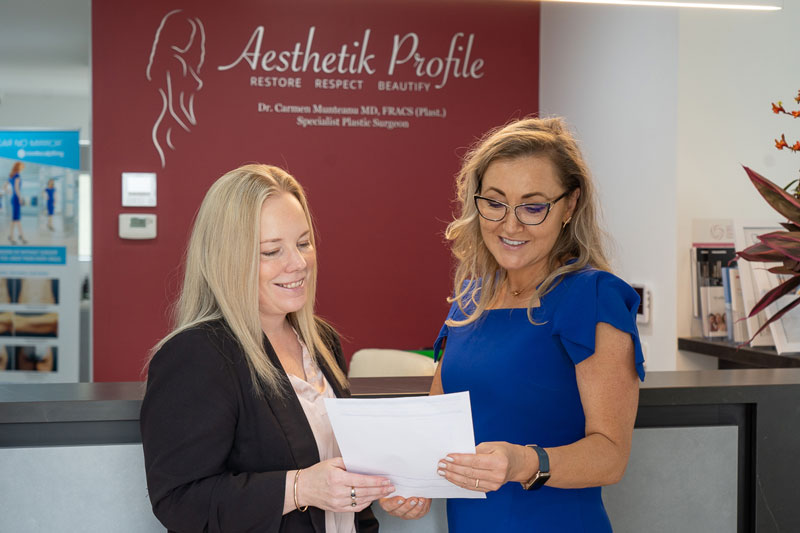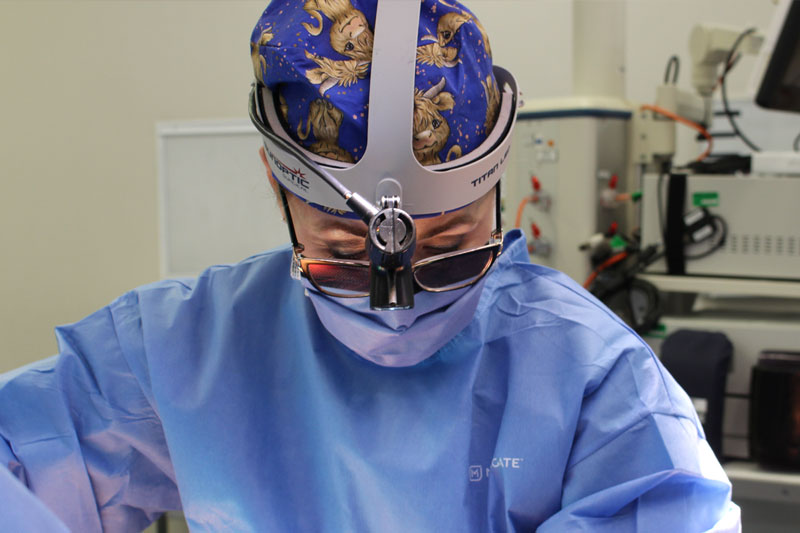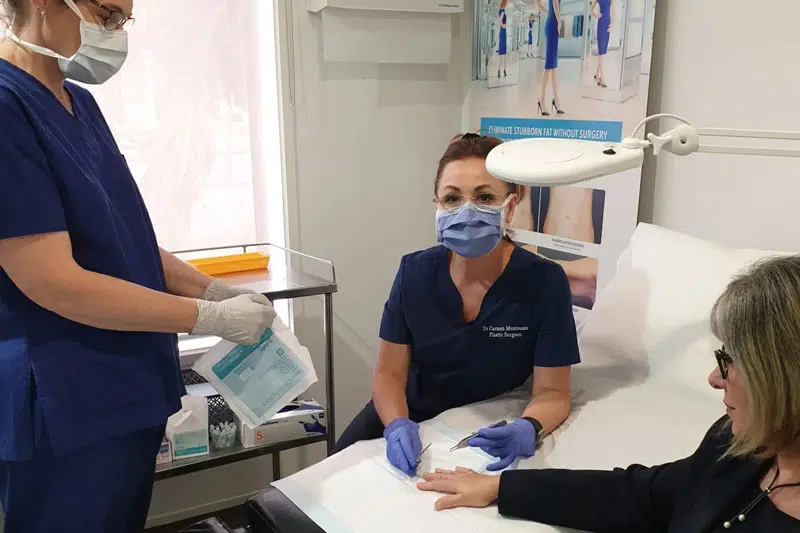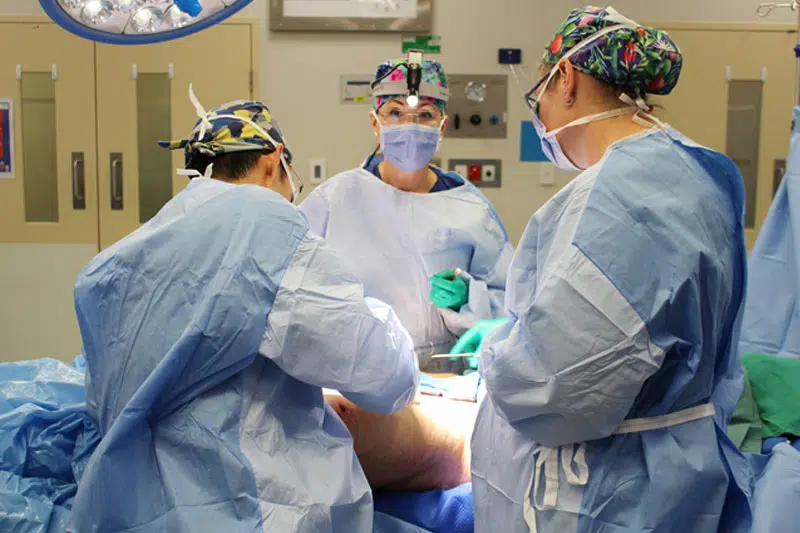What to Do 3 Months before Your Abdominoplasty Surgery Date
Abdominoplasty procedure is a popular choice for men and women who want to alter the appearance of the abdomen by removing excess skin and fat. In addition to a firmer and flatter midsection, it can also help tighten abdominal muscles. But before you make any decisions, it’s important to understand the basics of abdominoplasty surgery, including the procedure itself, recovery process, potential risks and preparation for the surgery.
In this blog, Melbourne Plastic Surgeon Dr Camen Munteanu we will guide you through the important steps to take to prepare for abdominoplasty surgery.
Take our Plastic Surgery Quiz to find out if you’d be a good candidate and if you are ready for cosmetic surgery.
Choosing the Right Surgeon for Abdominoplasty
When preparing for abdominoplasty surgery, one of the most important decisions you will make is choosing the right surgeon. It’s crucial to find a Specialist Plastic Surgeon who has extensive experience in performing abdominoplasty procedures. Take the time to research potential surgeons and schedule consultations to discuss your goals and concerns. During these consultations, ask about the surgeon’s qualifications, experience, and the specific techniques they use for abdominoplasty. It’s also important to ensure that you feel comfortable and confident in the surgeon’s abilities before moving forward with the procedure. The surgeon you choose will play a significant role in the outcome of your abdominoplasty, so it’s worth investing the time and effort to find the best fit for you.
Initial Consultation
Before undergoing abdominoplasty surgery, it is important to schedule an initial consultation with a Specialist Plastic Surgeon. During this consultation, the surgeon will evaluate your overall health, discuss your personal goals and expectations, and assess whether you are an ideal candidate for the procedure. It is crucial to be open and honest about your medical history, current medications, and lifestyle habits during this consultation. The surgeon will also use this time to explain the abdominoplasty procedure, outline the potential risks and complications, and answer any questions or concerns you may have. Additionally, the surgeon may take measurements and photographs of your abdominal area to use as a reference for the surgery. This initial consultation is a crucial step in your abdominoplasty preparation process and sets the foundation for a successful surgical experience.
Download Dr Carmen’s Guide to Tummy Tuck Surgery – Abdominoplasty
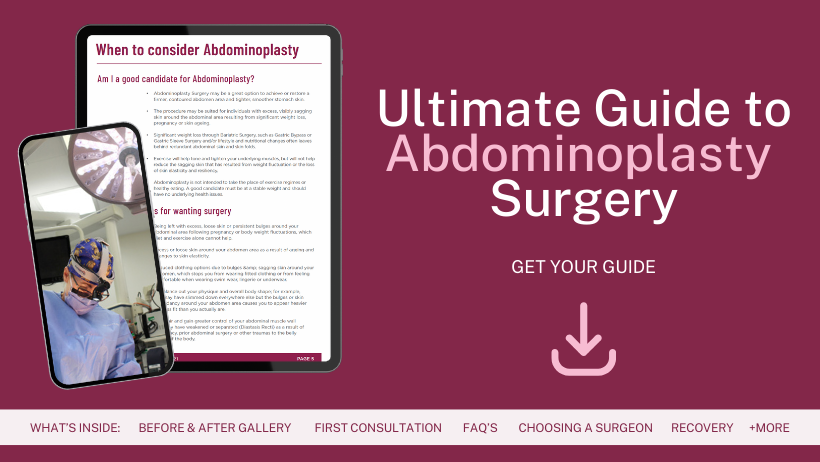
Preparing for Abdominoplasty: A Timeline Approach
Here is the timeline for preparing for abdominoplasty surgery:
3 Months before the Procedure
- Initial Consultation and Planning: Schedule a consultation with Dr Carmen to discuss your goals, medical history, and any concerns. This is the time to understand the procedure, risks, and expected outcomes
- Lifestyle Adjustments: Begin making lifestyle changes, particularly if you smoke. Smoking can significantly impair healing, so it’s crucial to quit smoking at least three months before the surgery
- Healthy Diet and Exercise: Start maintaining a balanced diet and regular exercise routine. Achieving a stable weight before surgery can enhance the results and recovery process. Focus on whole foods, lean proteins, fruits, vegetables, and whole grains
- Medical Evaluations: Undergo any necessary medical evaluations or lab tests as advised by Dr Carmen. This may include blood tests or a physical examination to ensure you’re fit for surgery
1 Month before the Procedure
- Medication Review: Review your medications with Dr Carmen. You may need to stop or adjust certain medications, especially blood thinners or supplements that can increase bleeding risks
- Nutritional Supplements: Begin taking recommended supplements to boost your immune system and promote healing, only after consulting with your plastic surgeon. Vitamins such as Vitamin C and A can be beneficial
- Finalise Surgery Details: Confirm the date of surgery, recovery arrangements, and post-operative care plans. Ensure you have someone to drive you home after the procedure and assist you during the initial recovery phase
- Mental Preparation: Prepare mentally for the surgery. Understand the recovery process and set realistic expectations for the outcomes
1 Week before the Procedure
- Pre-Operative Instructions: Follow Dr Carmen’s pre-operative instructions closely. This may include guidelines on eating, drinking, and medication adjustments
- Prepare Recovery Area: Prepare your recovery area at home. Ensure it’s comfortable, with essential items like pillows, ice packs, and post-surgery garments within easy reach.
- Avoid Certain Substances: Abstain from alcohol, as it can increase bleeding risks and affect the anaesthesia process. Also, avoid any medications or supplements not approved by your plastic surgeon
- Final Check-Up: Attend a final check-up with Dr Carmen if you need to go over the procedure again and address any last-minute questions or concerns
- Rest and Hydration: Get plenty of rest and stay hydrated. Good sleep and hydration are crucial for a successful surgery and recovery
The Night before Abdominoplasty Surgery
Preparing for abdominoplasty requires careful attention, especially the night before surgery. This preparation is important for ensuring a smooth procedure and optimal recovery. Here’s a guide on how to prepare on the eve of your surgery:
- Follow Fasting Instructions: Dr Carmen will likely advise you to fast, usually starting at midnight before your surgery. This means no food or drink, including water and chewing gum, to reduce the risk of complications during anaesthesia. It’s important to follow these instructions precisely
- Prepare Your Body: Take a shower the night before using an antibacterial soap, as advised by your surgeon. This helps to minimise the risk of infection post-surgery. Avoid applying any lotions, perfumes, or deodorants after your shower, as they can interfere with the surgical process
- Pack Your Bag: Prepare a bag with essential items you’ll need for the hospital or surgical centre. This may include your identification, insurance information, comfortable loose clothing (preferably button-down shirts or zip-up tops), slip-on shoes, and any special post-surgery garments recommended by Dr Carmen
- Arrange Transportation and Care: Confirm your transportation plans for getting to and from the surgical centre. Ensure that you have someone responsible to drive you home and stay with you for at least the first 24 hours after surgery, as you’ll be recovering from anaesthesia and will need assistance
- Set Up Your Recovery Area: Prepare a comfortable recovery area in your home with essentials like pillows, blankets, ice packs, and medications within easy reach. Having a relaxing, stress-free environment to return to post-surgery can significantly aid in your recovery
- Avoid Certain Medications: Refrain from taking any medications, including over-the-counter drugs and supplements that Dr Carmen advised you to avoid. These might increase bleeding risk or interact with anaesthesia
- Stay Hydrated and Rested: While you should follow fasting instructions, staying hydrated up until the point of fasting is important. Also, try to get a good night’s sleep. Resting well can help your body prepare for the stress of surgery and aid in a smoother recovery
- Mental Preparation: Spend some time relaxing and mentally preparing for your surgery. It’s normal to feel anxious, so consider engaging in calming activities like reading, listening to music, or meditation
- Last-Minute Questions: If you have any last-minute questions or concerns, don’t hesitate to contact your surgeon’s office. It’s important that you feel fully informed and at ease before your procedure
The Surgery Day
On the day of your abdominoplasty surgery, it’s essential to be well-prepared both physically and mentally. Wear loose, comfortable clothing and leave any jewellery or valuables at home. It’s important to have someone available to drive you home after the surgery and assist you during the initial recovery period.
Make sure to arrive at the surgical facility on time and be prepared for any pre-operative procedures such as signing consent forms and meeting with the surgical team.
Lastly, take a few deep breaths and try to stay as calm as possible – you’re in good hands with your experienced surgical team!
FAQs about How to Prepare for Abdominoplasty Surgery

How do I prepare my body for abdominoplasty?
- Preparing your body for abdominoplasty involves several key steps to ensure a safe procedure and optimal recovery. It’s important to achieve and maintain a stable weight, as significant weight fluctuations can affect the surgery’s outcome. Engaging in regular exercise and a balanced diet helps in toning your muscles and improving overall health. Smoking cessation is crucial at least a few weeks before and after the surgery, as smoking can hinder healing and increase the risk of complications. Additionally, discussing your medical history, current medications, and any supplements with Dr Carmen is vital to avoid any adverse interactions during the surgery.
What vitamins should I avoid before tummy tuck?
- Before undergoing a tummy tuck – abdominoplasty, it’s important to avoid certain vitamins and supplements that can increase the risk of bleeding or interact with anaesthesia. Vitamins and supplements to avoid usually include Vitamin E, omega-3 fatty acids, and herbal supplements like ginkgo biloba, garlic, ginseng, and St. John’s Wort. These substances can have blood-thinning effects or interfere with other medications used during surgery.
What can ruin a tummy tuck?
- Several factors can negatively impact the results of a tummy tuck – abdominoplasty. Significant weight gain or loss after the procedure can stretch the skin and alter the contours achieved through surgery, diminishing the aesthetic results. Pregnancy post-surgery can also stretch the abdominal area, potentially reversing the benefits of the tummy tuck. Not adhering to post-operative guidelines, such as engaging in strenuous activities too soon or neglecting proper wound care, can lead to complications like infections or poor scarring. Smoking is another major factor that can impair healing and increase the risk of complications. Therefore, maintaining a stable weight, following post-operative care instructions, and leading a healthy lifestyle are crucial for preserving the results of a tummy tuck – abdominoplasty.
What medicines should be avoided before surgery?
- Before surgery, certain medications should be avoided as they can increase the risk of bleeding, affect blood pressure, or interact with anaesthetics. These include blood thinners like warfarin, aspirin, and some anti-inflammatory drugs like ibuprofen and naproxen. Certain herbal supplements and vitamins, as mentioned earlier, should also be avoided. Medications affecting blood pressure, such as beta-blockers or ACE inhibitors, may need to be adjusted. It’s essential to provide Dr Carmen with a complete list of all medications, including over-the-counter drugs and supplements, so she can advise on which ones to stop and when to do so safely.
What vitamins should I take to prepare for tummy tuck – abdominoplasty?
- To prepare for a tummy tuck – abdominoplasty, taking certain vitamins can help enhance your body’s ability to heal and recover. Vitamins A and C are particularly beneficial as they play a crucial role in wound healing and immune function. Vitamin A aids in skin regeneration and collagen production, while Vitamin C is essential for collagen synthesis and tissue repair. It’s also important to ensure adequate protein intake, as proteins are vital for tissue repair and healing. However, it’s crucial to consult with Dr Carmen before starting any new vitamins or supplements, as she can provide tailored advice based on your specific health needs and the details of your upcoming surgery.
Further Reading about Abdominoplasty Surgery with Dr Carmen
- Read Dr Carmen’s Blog about Tummy Tuck FAQs – Questions about Abdominoplasty
- Read Dr Carmen’s Blog about Will Medicare Cover My Tummy Tuck – Abdominoplasty?
- Read Dr Carmen’s Blog about Recovery after Tummy Tuck – Tips, Timeline and FAQs after Abdominoplasty
- Read Dr Carmen’s Blog about Tips to Reduce Scars after Your Tummy Tuck/ Abdominoplasty Procedure
- Read Dr Carmen’s Blog about Compression Garments after Abdominoplasty
- Read Dr Carmen’s Blog about When Can I Plank after Abdominoplasty – Tummy Tuck Surgery
- Read Dr Carmen’s Blog about How Can I Reduce Swelling and Bruising after Abdominoplasty Surgery
Medical References about Abdominoplasty Surgery
- Tummy Tuck Preparation – ASPS
- Your 6-month guide to planning a tummy tuck
- Tummy tuck – Mayo Clinic
- Abdominoplasty – StatPearls
- Tummy Tuck Surgery (Abdominoplasty) – WebMD


